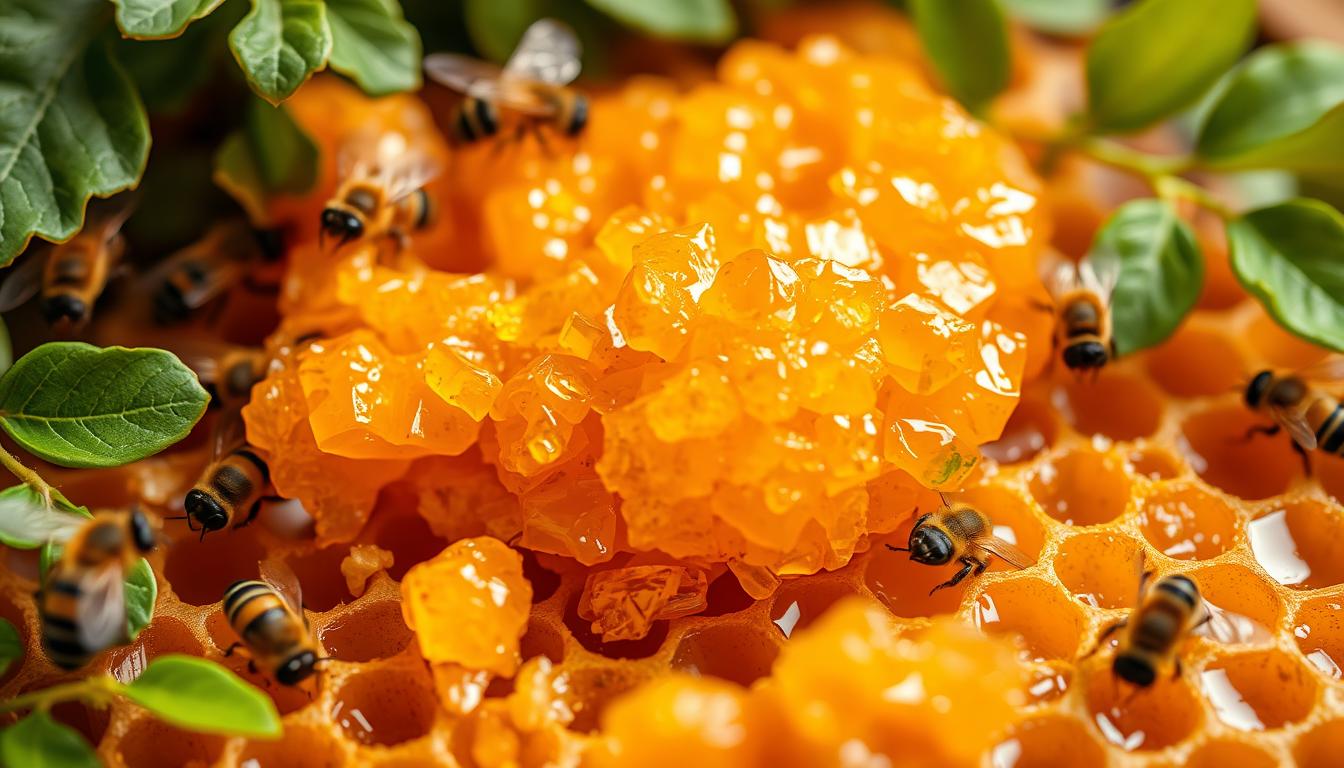Have you ever wondered about the remarkable properties of propolis, the resinous substance produced by honeybees? This natural compound, often referred to as “bee glue,” is much more than just a adhesive for hive construction – it’s a powerhouse of health benefits that can positively impact your overall well-being. In this article, we’ll explore the amazing advantages of incorporating propolis into your daily routine.
Key Takeaways
- Propolis is a resinous substance produced by honeybees with a wide range of medicinal uses.
- Propolis possesses powerful antioxidant properties that can protect your cells from damage.
- Propolis has proven antimicrobial and antiviral effects, helping to fight bacteria and viruses naturally.
- Propolis can support wound healing and promote a healthy immune system.
- Propolis exhibits anti-inflammatory properties and may benefit oral health.
So, what exactly is propolis, and how can it enhance your overall well-being? Let’s dive in and uncover the remarkable benefits of this natural marvel.
What is Propolis?
Propolis is a fascinating substance that plays a vital role in the lives of honeybees. It is a sticky, resinous material that bees collect from various plant sources, such as tree buds, sap, and leaf buds. Bees use this remarkable resin to seal and protect their hives, creating a barrier against the outside world.
The Remarkable Resin Produced by Honeybees
Propolis is a complex mixture of compounds, including resins, waxes, essential oils, and pollen. Bees meticulously gather these materials and then use their specialized enzymes to transform them into the sticky, protective substance we know as propolis. This unique blend of natural ingredients gives propolis its remarkable properties and versatility.
Composition and Sources of Propolis
The exact composition of propolis can vary depending on the geographic location and the plant sources available to the bees. However, studies have shown that propolis is typically composed of 50% resins, 30% waxes, 10% essential oils, and 5% pollen. The most common plant sources for propolis include poplar, birch, alder, and conifer trees.
| Propolis Composition | Percentage |
|---|---|
| Resins | 50% |
| Waxes | 30% |
| Essential Oils | 10% |
| Pollen | 5% |
“Propolis is a remarkable substance that showcases the incredible ingenuity and adaptability of honeybees. It is a testament to the wonders of the natural world.”
Powerful Antioxidant Properties of Propolis
Propolis, the resinous substance produced by honeybees, is renowned for its exceptional antioxidant properties. This natural compound is rich in polyphenolic compounds, which are powerful antioxidants that help neutralize harmful free radicals and reduce oxidative stress within the body.
The antioxidant capabilities of propolis are derived from its diverse array of bioactive compounds, including flavonoids, phenolic acids, and terpenes. These potent antioxidants work to scavenge and eliminate free radicals, which can otherwise damage cells, proteins, and DNA, leading to various health issues.
Studies have demonstrated the impressive ability of propolis to inhibit the production of reactive oxygen species (ROS) and enhance the activity of the body’s natural antioxidant enzymes, such as superoxide dismutase and glutathione peroxidase. By restoring the balance between oxidants and antioxidants, propolis contributes to overall cellular health and supports the body’s defense mechanisms.
| Antioxidant Compound | Percentage in Propolis |
|---|---|
| Flavonoids | 30-45% |
| Phenolic Acids | 15-30% |
| Terpenes | 10-15% |
The potent antioxidant properties of propolis make it a valuable natural remedy for supporting overall health and well-being. By incorporating propolis into your daily routine, you can harness the power of this remarkable substance to combat oxidative stress and promote optimal cellular function.
“Propolis is a remarkable natural substance that possesses exceptional antioxidant capabilities, making it a valuable asset for maintaining overall health and well-being.”
Antimicrobial and Antiviral Effects of Propolis
Propolis, the remarkable resin produced by honeybees, has long been celebrated for its potent antimicrobial and antiviral properties. Numerous studies have demonstrated propolis’ ability to inhibit the growth of various bacteria, fungi, and viruses, making it a powerful natural agent for fighting infections.
Fighting Bacteria and Viruses Naturally
The antimicrobial and antiviral effects of propolis are attributed to its diverse chemical composition, which includes a rich array of flavonoids, phenolic compounds, and other bioactive substances. These compounds work synergistically to disrupt the cell walls and membranes of harmful microorganisms, preventing them from thriving and causing infections.
- Propolis has been shown to be effective against a wide range of bacterial pathogens, including Staphylococcus aureus, Escherichia coli, and Pseudomonas aeruginosa, among others.
- Its antiviral properties have been studied in relation to various viruses, such as influenza, herpes simplex, and even the SARS-CoV-2 virus, the causative agent of COVID-19.
- The antimicrobial and antiviral effects of propolis make it a valuable natural remedy for supporting the body’s defenses against infections, especially in the respiratory system.
“Propolis has been used for centuries as a natural medicine, and its antimicrobial and antiviral properties have been well-documented in scientific literature. This natural substance offers a promising alternative to synthetic antibiotics and antivirals, with the added benefit of supporting overall health and well-being.”
By harnessing the power of propolis, individuals can explore a natural and effective way to bolster their defenses against harmful microorganisms and maintain their overall health and wellness.
Propolis Benefits for Wound Healing
Propolis, the remarkable resin produced by honeybees, is a natural powerhouse when it comes to supporting wound healing. This multi-functional substance has a long history of use in traditional medicine, and modern research has unveiled its remarkable properties that can accelerate the healing process.
One of the key benefits of propolis for wound healing is its anti-inflammatory effect. Propolis contains compounds that can help reduce inflammation and swelling, which are common in the early stages of wound healing. By modulating the body’s inflammatory response, propolis can create a more favorable environment for tissue repair and regeneration.
Moreover, propolis has demonstrated antimicrobial properties, making it effective in fighting off harmful bacteria and preventing infections. This is crucial for wound healing, as preventing infection is essential for the successful closure and healing of wounds. Propolis can be applied topically to help maintain a clean and healthy wound environment.
Interestingly, propolis also exhibits tissue-regenerative capabilities. Studies have shown that propolis can stimulate the growth and proliferation of skin cells, including fibroblasts and keratinocytes, which are crucial for the formation of new tissue and the closure of the wound.
| Propolis Properties | Benefits for Wound Healing |
|---|---|
| Anti-inflammatory | Reduces inflammation and swelling |
| Antimicrobial | Fights off harmful bacteria and prevents infections |
| Tissue-regenerative | Stimulates the growth and proliferation of skin cells |
These remarkable properties of propolis make it a valuable natural remedy for supporting the body’s own healing mechanisms. By harnessing the power of this bee-derived resin, individuals can promote faster and more effective wound healing, ultimately aiding in the restoration of healthy skin and tissue.
“Propolis has been used for centuries in traditional medicine due to its remarkable healing properties. Modern research has confirmed its efficacy in supporting the body’s natural wound healing processes.”
Propolis Benefits for Immune System Support
Propolis, the remarkable resin produced by honeybees, has been found to offer remarkable benefits for the immune system. This natural compound has the remarkable ability to stimulate the activity of key immune cells, such as T cells and natural killer cells, which play a crucial role in the body’s defense against various illnesses and infections.
Boosting Your Body’s Defense Mechanisms
Numerous studies have demonstrated the immune-enhancing properties of propolis. By supporting the function of the immune system, propolis can help strengthen the body’s natural defenses, making it more resilient in the face of threats like bacteria, viruses, and other pathogens. This is particularly beneficial for individuals looking to propolis immune support and maintain optimal health.
- Propolis has been found to stimulate the activity of T cells, which play a crucial role in cell-mediated immunity.
- It also enhances the function of natural killer cells, which are responsible for identifying and destroying infected or cancerous cells.
- The antioxidant properties of propolis contribute to its immune-boosting effects by protecting immune cells from oxidative stress.
Incorporating propolis immune support into your daily routine can be a valuable strategy for maintaining a robust and resilient immune system. Whether through supplements, tinctures, or other propolis-based products, this natural remedy offers a natural way to fortify your body’s defenses and support overall well-being.
| Key Immune System Benefits of Propolis | Description |
|---|---|
| Stimulates T Cell Activity | Propolis has been found to enhance the function of T cells, which are crucial for cell-mediated immunity. |
| Enhances Natural Killer Cell Function | Propolis supports the activity of natural killer cells, which identify and destroy infected or cancerous cells. |
| Antioxidant Properties | The antioxidant compounds in propolis help protect immune cells from oxidative stress, contributing to their enhanced function. |
“Propolis has been demonstrated to have a positive effect on the immune system, stimulating the activity of key immune cells and helping to strengthen the body’s natural defenses.”
By harnessing the power of propolis immune support, individuals can take a proactive approach to maintaining a robust and resilient immune system, naturally supporting their overall well-being and health.
Anti-Inflammatory Properties of Propolis
Propolis, the remarkable resin produced by honeybees, is renowned for its potent anti-inflammatory properties. This natural substance contains a wealth of compounds that can effectively reduce inflammation, making it a valuable natural remedy for managing various inflammatory conditions.
The anti-inflammatory effects of propolis are attributed to its rich composition of bioactive compounds, such as flavonoids, phenolic acids, and terpenes. These compounds work synergistically to inhibit the production of pro-inflammatory mediators, like prostaglandins and leukotrienes, which are key drivers of inflammation.
Numerous studies have demonstrated the efficacy of propolis in reducing inflammation. For instance, research has shown that propolis can significantly alleviate swelling, redness, and pain associated with conditions like arthritis, dermatitis, and even certain types of cancer. This makes propolis a promising natural option for individuals seeking to manage inflammation-related issues without the potential side effects of conventional medications.
| Compound | Anti-Inflammatory Mechanism |
|---|---|
| Flavonoids | Inhibit the production of pro-inflammatory enzymes and cytokines |
| Phenolic Acids | Reduce oxidative stress and modulate inflammatory signaling pathways |
| Terpenes | Possess anti-inflammatory and immunomodulatory properties |
By incorporating propolis anti-inflammatory properties into your daily routine, you can harness the power of this natural remedy to support your overall health and well-being. Whether through dietary supplements, topical applications, or even as a component in certain natural healthcare products, propolis offers a promising alternative for those seeking to address inflammation-related concerns.

Potential Benefits for Oral Health
Propolis, the remarkable resin produced by honeybees, has been the subject of extensive research for its potential benefits in supporting oral health. This natural substance has demonstrated its ability to inhibit the growth of harmful bacteria in the mouth, reduce inflammation in the gums, and promote the healing of dental injuries or infections.
Propolis and Dental Care
One of the key advantages of propolis in dental care is its antimicrobial properties. Studies have shown that propolis can effectively inhibit the growth of various bacteria that can lead to dental plaque, tooth decay, and gum disease. By targeting these harmful microorganisms, propolis may help maintain a healthy oral environment and reduce the risk of common dental issues.
Moreover, propolis has been found to possess anti-inflammatory effects, which can be particularly beneficial for individuals with gingivitis or other inflammatory conditions in the mouth. By reducing inflammation, propolis may alleviate symptoms such as swollen and bleeding gums, contributing to improved gum health.
In addition, propolis has demonstrated the ability to promote the healing of dental wounds and infections. This property can be advantageous in the treatment of various oral health problems, such as mouth sores, canker sores, or post-surgical healing following dental procedures.
| Propolis Oral Health Benefits | Key Findings |
|---|---|
| Antimicrobial properties | Inhibits the growth of harmful oral bacteria |
| Anti-inflammatory effects | Reduces inflammation in the gums |
| Wound healing promotion | Supports the healing of dental injuries and infections |
The potential benefits of propolis for oral health make it a promising natural alternative for maintaining a healthy mouth and addressing various dental concerns. As with any health supplement, it is recommended to consult with a healthcare professional before incorporating propolis into your dental care routine.
Propolis Benefits for Overall Well-being
Propolis, the remarkable resin produced by honeybees, offers far-reaching benefits that extend beyond specific health concerns. This natural compound has been shown to contribute to overall well-being by supporting a healthy immune system, reducing inflammation, and providing powerful antioxidant protection.
Incorporating propolis into your daily routine can help promote your general health and vitality. Let’s explore how this remarkable substance can enhance your overall well-being:
Immune System Support
Propolis is renowned for its ability to bolster the immune system, helping the body defend against a wide range of threats. Its antimicrobial and antiviral properties make it a valuable ally in maintaining a robust and responsive immune response, which is essential for overall well-being.
Anti-Inflammatory Benefits
Chronic inflammation has been linked to a host of health issues, from cardiovascular disease to autoimmune disorders. Propolis, with its potent anti-inflammatory effects, can help reduce inflammation throughout the body, contributing to improved overall health and well-being.
Antioxidant Protection
Propolis is rich in antioxidants, which play a crucial role in neutralizing harmful free radicals and protecting cells from oxidative stress. By safeguarding the body’s cells and tissues, propolis can help support overall vitality and resilience.
| Propolis Benefit | Impact on Well-being |
|---|---|
| Immune System Support | Strengthens the body’s natural defenses against threats |
| Anti-Inflammatory Effects | Helps reduce chronic inflammation, which can contribute to various health issues |
| Antioxidant Protection | Safeguards cells and tissues from oxidative stress, promoting overall vitality |
By harnessing the remarkable properties of propolis, individuals can experience a range of benefits that contribute to their overall well-being, from a more robust immune system to reduced inflammation and enhanced antioxidant defenses.

How to Incorporate Propolis into Your Daily Routine
Propolis, the remarkable resin produced by honeybees, offers a wealth of potential benefits for overall health and well-being. Integrating propolis into your daily routine can be a simple and effective way to harness the power of this natural compound.
One of the most convenient ways to incorporate propolis is through supplements. Propolis supplements are available in various forms, such as capsules, tinctures, or lozenges. These allow for easy and consistent intake, ensuring you can consistently reap the benefits of propolis.
For topical applications, propolis can be found in creams, ointments, or salves. These can be applied to the skin, targeting specific areas of concern, such as wound healing or skin irritation. The antimicrobial and anti-inflammatory properties of propolis make it a valuable addition to your skincare regimen.
When using propolis, it’s important to consult with a healthcare professional to determine the appropriate dosage and method of administration for your individual needs. This will help ensure you are using propolis safely and effectively to support your overall health and well-being.
Versatile Ways to Incorporate Propolis
- Propolis supplements (capsules, tinctures, lozenges)
- Topical propolis creams, ointments, or salves
- Propolis-infused oral care products (toothpaste, mouthwash)
- Propolis-based skincare items (cleansers, serums, masks)
Remember, incorporating propolis into your daily routine can be a simple and effective way to support your overall health and well-being. Consult with a healthcare professional to determine the best approach for your individual needs.
“Propolis has been used for centuries due to its remarkable health benefits. Integrating it into your daily routine can be a game-changer for your overall well-being.”
| Propolis Supplement Form | Potential Benefits | Recommended Usage |
|---|---|---|
| Capsules | Antioxidant support, immune system boost | Follow product instructions or consult healthcare provider |
| Tinctures | Antimicrobial and anti-inflammatory effects | Mix with water or juice, or take sublingually |
| Lozenges | Oral health support, soothing for throat | Dissolve slowly in the mouth as directed |
Conclusion
The remarkable resin produced by honeybees, known as propolis, offers a wealth of health benefits that are worth exploring. From its powerful antioxidant properties to its antimicrobial and anti-inflammatory effects, propolis has proven to be a versatile and valuable natural remedy.
Whether you’re looking to boost your immune system, support overall well-being, or address specific health concerns, incorporating propolis into your daily routine can be a beneficial addition. The diverse range of benefits, including wound healing, oral health support, and potential anti-aging effects, make propolis a compelling choice for those seeking natural and holistic approaches to their health.
As you continue on your journey to optimize your well-being, consider the remarkable advantages that propolis can provide. By harnessing the power of this remarkable natural resource, you can unlock a new level of health and vitality, empowering you to live your best life.

